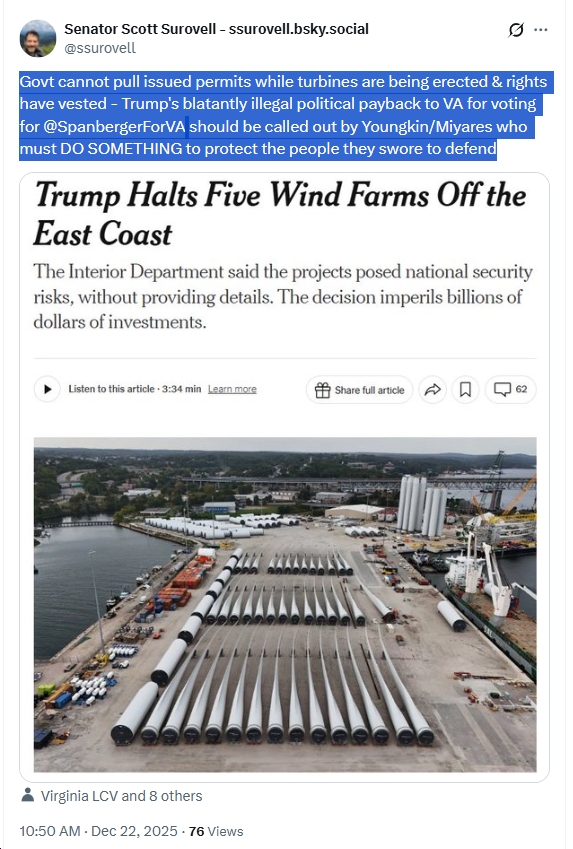From Appalachian Voices and Clean Virginia; time to break up Dominion?
Historic bipartisan bill would open Virginia’s electricity market to competition
Richmond – Legislation will be introduced for the 2020 General Assembly session that would end monopoly control over Virginia’s electricity system, creating competition in the retail sector while protecting consumers from unnecessary and excessive rate hikes. The Virginia Energy Reform Act — announced today at a joint press conference by the bill’s sponsor, Delegate Mark Keam (D), and chief co-patron, Delegate Lee Ware (R) — would be the first major reform of Virginia’s electricity market in almost 15 years.
“I’m pleased to join my friend Delegate Lee Ware in introducing the Virginia Energy Reform Act, which would bring transformational reforms to our energy marketplace,” said Delegate Keam. “Over the past couple of decades, innovation and technological advancements have allowed consumers around the nation to choose when, where and how they obtain affordable and reliable energy. But in Virginia, we are stuck with a century-old business-as-usual model that benefits monopolies while suppressing competition and consumer choice. It’s time to reform the rules of the road.”
“This legislation, which I trust will gain broad bi-partisan support, will chart a course toward engendering much-needed competition in the retail sales of vital electricity services. I am delighted to team with my colleague Delegate Mark Keam in advancing the proposal,” said Del. Ware.
Under the current system, monopolies including Dominion Energy and Appalachian Power own and operate all segments of a vertically integrated system in Virginia— electricity generation, the distribution system of wires and power poles and retail customer services. (The current system of high-voltage transmission lines for wholesale distribution is operated by the multi-state, independent PJM and would not be directly impacted by the bill.)
Among other things, the Virginia Energy Reform Act would:
- Establish a well-designed, competitive market for electricity retailers to give families and businesses a choice.
- Require monopoly electric utilities to exit the retail services and generation businesses and be limited to just owning and maintaining the distribution system.
- Establish a nonprofit independent entity that has no financial stake in electricity market outcomes to coordinate operation of the distribution system.
- Remove existing interconnection and financing barriers to customer-owned energy resources.
- Build in additional consumer protections and education to ensure smart energy choices.
“Virginia is shackled to a monopoly utility model that stifles innovation, increases costs and puts government in the difficult role of replacing competition. It’s time for Virginia to liberate market forces, empower consumers and shift the role of government to facilitate competition. Competitive markets are the path to an innovative and consumer-friendly clean energy future. It’s time for Virginia to make the right choice,” said Devin Hartman, Director of Energy and Environmental Policy at the R Street Institute.
“Our mission at VPLC is to break down systemic barriers that keep Virginians in poverty,” said Dana Wiggins, Director of Outreach and Financial Advocacy, with the Virginia Policy Law Center. “Virginia’s current energy regulatory structure is broken and disproportionately affects low-income people who pay a higher percentage of their household income on energy than moderate- or high-income households. All families want affordable electricity bills. This legislation includes a program that provides protections for them to be able to have just that.”
“The state-sanctioned energy monopoly is a model for the 19th century, not the 21st. The technology of the 21st century is smart, on-demand, and oriented to the needs that consumers have not even considered yet,” said Lynn Taylor, President of the Virginia Institute for Public Policy. “There is considerable potential for consumer-centric innovation in our energy market, innovation borne of competition, and Virginia has an opportunity to be at the razor’s edge of this movement. For the last 120 years, the monopolies of the Old Dominion have shown how inefficient and costly they can be. As Virginians, we can make the roaring 2020s the decade of the consumer.”
The Virginia Energy Reform Coalition worked in conjunction with Delegates Ware and Keam to provide technical and legal expertise on the bill. The bipartisan coalition formed in May 2019 to advocate for a 21st-century electricity system in Virginia that increases market competition and consumer choice, provides a safety net for the most vulnerable households, protects the environment and reliably serves the Commonwealth.


















